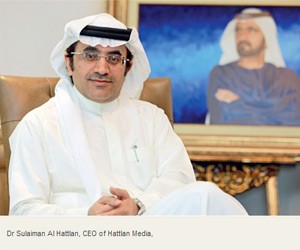Hattlan Media founder emphasises getting the word out in Arabic for businesses as well.
Dubai: Dr Sulaiman Al Hattlan does not much care for giving spin to a message. As a media training consultant and founder of Hattlan Media, he believes more will be gained by ensuring a message — be it from any organisation or individual — finds a direct and immediate connect with the intended audience.
“Media training is not only about the messages — it’s about breaking the fear barrier and learning how to truly represent your organisation and brand with strong messages and also strong presentations,” said Al Hattlan, whose roster includes retainer clients as well as those who come in strictly on a project basis.
“At the end of the day, no journalist would appreciate an interview where the spokesperson is communicating confused messages and unclear answers. It is an opportunity for spokespeople to appreciate the work of media and realise its power in turning any potential “publicity crisis” that would negatively affect the organisation’s image into a positive experience with positive outcomes.”
Clearly, Al Hattlan wants to be quite some distance removed from the unctuous world of spin doctors and loaded messages that get churned out day in, day out into the media universe. It is also a highly splintered industry with new digital platforms and news aggregators being created and ravenous for 24×7 content generation.
“I am personally a great believer in how digital age has changed many ‘rules of the game’ in communications,” said Al Hattlan. “New media is offering extra platforms for communications and, in some cases depending on the client’s target audience, these have become the primary communication channels that the client needs to focus on.”
One area that Al Hattlan focuses on is to ensure his clients acquire an ease in communicating in Arabic. “We do live in a cosmopolitan society and English seems to be the common language,” said Al Hattlan. “But we also live in Arab countries where the government’s first language is Arabic.
“Communicating your business in Arabic doesn’t only reinforce your Arabic identity but also opens up new opportunities for non-Arab companies through reaching a wider audience in the region.
“We don’t see a problem with Arabic spokespeople communicating in English, but it’s their skills in communicating in Arabic that need harnessing. Many a time it’s because of the industry where the terminologies are better known in English and not Arabic.
“Our command in Arabic language and knowledge of cultural and political sensitivities of the region allow us to help organisations to craft their messages in Arabic and communicate it according to best practices.”
And what should clients not lose sight of under any circumstances? According to Al Hattlan, they should stay on message, don’t be intimidated and enjoy.






